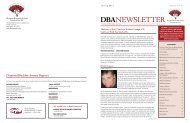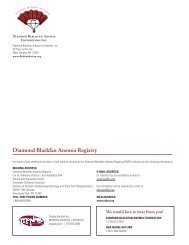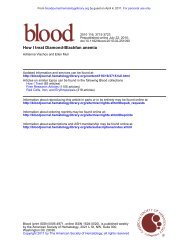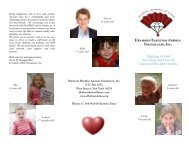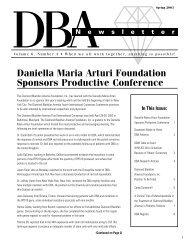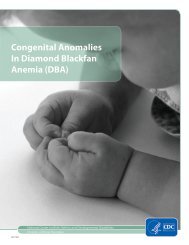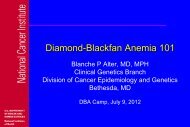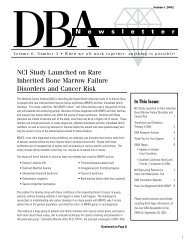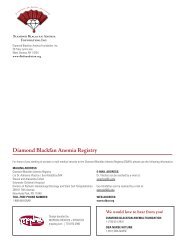DBA - Diamond Blackfan Anemia Foundation, Inc.
DBA - Diamond Blackfan Anemia Foundation, Inc.
DBA - Diamond Blackfan Anemia Foundation, Inc.
You also want an ePaper? Increase the reach of your titles
YUMPU automatically turns print PDFs into web optimized ePapers that Google loves.
<strong>Diamond</strong><br />
<strong>Blackfan</strong><br />
<strong>Anemia</strong><br />
(<strong>DBA</strong>)<br />
Answers to<br />
commonly<br />
asked<br />
questions<br />
What is <strong>Diamond</strong> <strong>Blackfan</strong> <strong>Anemia</strong>?<br />
<strong>Diamond</strong> <strong>Blackfan</strong> <strong>Anemia</strong> (<strong>DBA</strong>) is a rare blood disorder. In<br />
<strong>DBA</strong>, the bone marrow (the center of the bone where blood<br />
cells are made) does not make enough red blood cells that<br />
carry oxygen throughout the body.<br />
What causes <strong>DBA</strong>?<br />
<strong>DBA</strong> is usually diagnosed during the first year of life. Some<br />
people have a family history of the disorder. About one-quarter<br />
of people with <strong>DBA</strong> have a known genetic cause. In many<br />
people with <strong>DBA</strong>, we do not know the cause.<br />
How many people have <strong>DBA</strong>?<br />
There are about 25-35 new cases of <strong>DBA</strong> per year in the<br />
United States and Canada.<br />
Can anyone have <strong>DBA</strong>?<br />
<strong>DBA</strong> affects both boys and girls equally. It occurs in every<br />
ethnic group.<br />
Can other family members have <strong>DBA</strong>?<br />
Yes, if you have <strong>DBA</strong> there is up to a 50 percent chance that<br />
each of your children will have <strong>DBA</strong>. Symptoms can be very mild<br />
to very severe.<br />
Where did <strong>DBA</strong> get its name?<br />
The anemia was named for Dr. Louis K. <strong>Diamond</strong> and<br />
Dr. Kenneth D. <strong>Blackfan</strong>, the first doctors who documented<br />
cases of the disease in the 1930s.<br />
What are the signs and symptoms of <strong>DBA</strong>?<br />
People with <strong>DBA</strong> have symptoms common to all other types of anemia,<br />
including pale skin, sleepiness, rapid heartbeat, and heart murmurs.<br />
In some cases there are no obvious physical signs of <strong>DBA</strong>. About<br />
one-quarter of people with <strong>DBA</strong> have abnormal features involving the face,<br />
head, and hands, especially the thumbs. They may also have heart and<br />
kidney defects. Many children are short for their age and may start puberty<br />
later than normal.
Notes from <strong>DBA</strong> Patients<br />
and Their Families<br />
Remember, you are not<br />
alone! T here are hundreds<br />
of others around the<br />
world, just like you, living<br />
with <strong>DBA</strong>. We are here to<br />
help each other.<br />
—David'’s Mom<br />
How do doctors know if someone<br />
has <strong>DBA</strong>?<br />
Several tests may be used to tell if a person has <strong>DBA</strong>.<br />
One test your doctor can perform is called a bone marrow<br />
aspirate. This is where a needle is inserted into the bone<br />
and a small amount of bone marrow fluid is taken out and<br />
studied under a microscope. You may also have blood tests<br />
to see if there is a genetic basis for <strong>DBA</strong> or certain chemical<br />
abnormalities linked to <strong>DBA</strong>.<br />
Will iron help reduce the anemia?<br />
No. <strong>DBA</strong> is not caused by a lack of iron or other nutrients.<br />
T here are a number of <strong>DBA</strong><br />
specialists and support<br />
groups available; scientific<br />
studies are ongoing and new<br />
treatment options are<br />
being made available.<br />
—Julia<br />
<strong>Diamond</strong> <strong>Blackfan</strong><br />
<strong>Anemia</strong> is a treatable,<br />
manageable, and, some<br />
day, curable disorder.<br />
—José<br />
Become your child's advocate,<br />
because many doctors are<br />
not familiar with <strong>DBA</strong>.<br />
Do your homework and<br />
become part of the<br />
decisionmaking process.<br />
—Ashly's Dad<br />
How is <strong>DBA</strong> treated?<br />
To treat very low red blood cell counts in <strong>DBA</strong> patients,<br />
the two common options for treating <strong>DBA</strong> are<br />
corticosteroids and blood transfusions. Bone marrow/<br />
stem cell transplantation may also be considered.<br />
Some children need no specific therapy. Your doctor<br />
will recommend the best treatment for you.<br />
What is corticosteroid treatment?<br />
Corticosteroids are drugs used to treat many medical<br />
conditions. One type of corticosteroid is called oral<br />
prednisone, one of the most successful treatments for<br />
children with <strong>DBA</strong>.<br />
What are the side effects of<br />
corticosteroid treatment?<br />
Major side effects when these drugs are used in high<br />
doses for a long time include weight gain, water and<br />
salt retention, high blood pressure, muscle weakness,<br />
osteoporosis (brittle bones occasionally leading to fractures),<br />
wounds that won’t heal, headaches, growth problems, eye<br />
diseases such as cataracts and glaucoma, and the disruption<br />
of hormones that regulate normal body functions, including<br />
diabetes. Patients on these drugs should be watched<br />
carefully.<br />
What is a blood transfusion?<br />
In a blood transfusion, a person<br />
receives healthy red blood cells<br />
from another person. Transfusions<br />
may be needed every 3-5 weeks.
With good medical management,<br />
<strong>DBA</strong> patients can live long, healthy, active lives.<br />
Living with <strong>DBA</strong><br />
People with <strong>DBA</strong> can live long, healthy, active<br />
lives through good medical care and a healthy<br />
lifestyle. As long as their hemoglobin levels are<br />
high enough (hemoglobin is the substance in the<br />
red blood cells that supplies oxygen to all cells in<br />
the body), people with <strong>DBA</strong> can take part in all<br />
activities, usually without limitations.<br />
Do blood transfusions have any<br />
complications?<br />
Sometimes patients can develop transfusion reactions<br />
with fever and rash. Medication may be given before the<br />
next transfusion to help prevent these symptoms. Red cell<br />
transfusions can also cause a build-up of extra iron in<br />
the body which can harm the heart and/or liver, cause<br />
diabetes, or slow down normal growth. The amount of<br />
iron must be regularly checked. If iron levels are too high,<br />
your doctor may recommend drugs to remove excess iron<br />
in body tissues. This process is called chelation therapy.<br />
People getting transfusions should avoid iron supplements.<br />
What is bone marrow/stem cell<br />
transplantation?<br />
Bone marrow/stem cell transplantation replaces a<br />
patient’s bone marrow/stem cells with those from a<br />
healthy, matching donor.<br />
Are there other treatment options<br />
for <strong>DBA</strong>?<br />
Other treatment options are being studied but to date none<br />
work as well as corticosteroids or transfusion therapy. The<br />
goal is to one day find a safe, reliable cure, possibly using<br />
gene therapy. But this is still many years away.<br />
Who can I call with questions?<br />
For answers to your immediate medical questions, call the<br />
<strong>DBA</strong> nurse, Ellen Muir, RN, MSN, at 1 (877) <strong>DBA</strong>-NURSE.<br />
To talk to a parent of children with <strong>DBA</strong>, call the <strong>DBA</strong><br />
<strong>Foundation</strong> at (716) 674-2818.<br />
Finding out that you or your child has <strong>DBA</strong> can<br />
be scary and overwhelming. Here are some tips<br />
to help you cope.<br />
• Contact the <strong>Diamond</strong> <strong>Blackfan</strong> <strong>Anemia</strong><br />
<strong>Foundation</strong> to get in touch with families in<br />
the support network (see back of this brochure).<br />
• Enroll in the <strong>Diamond</strong> <strong>Blackfan</strong> <strong>Anemia</strong><br />
Registry. This is a patient registry dedicated to<br />
collecting, analyzing, and sharing information<br />
on <strong>DBA</strong> (see back of this brochure).<br />
• Join a support group. A list of online <strong>DBA</strong><br />
support groups is included on the back of<br />
this brochure.<br />
• Learn as much as you can about <strong>DBA</strong>.<br />
If you don’t understand the medical terms and<br />
concepts, ask your doctor to explain. Take<br />
notes, tape conversations, and ask questions<br />
during doctor visits. Use a notebook to<br />
organize your medical information. Build a<br />
strong partnership with your medical team.<br />
• Stay positive. Research on <strong>DBA</strong> and other<br />
related conditions may soon lead to better<br />
treatments, new cures, and improved quality<br />
of life for people with <strong>DBA</strong>.<br />
• Talk with a mental health professional.<br />
Psychologists, social workers, and counselors<br />
can help you deal with the challenges of<br />
living with <strong>DBA</strong>.
For information, networking, and support for living with <strong>DBA</strong>, contact—<br />
<strong>Foundation</strong>s<br />
<strong>Diamond</strong> <strong>Blackfan</strong> <strong>Anemia</strong> <strong>Foundation</strong> (<strong>DBA</strong>F)<br />
Funds medical research projects, provides emotional<br />
support to families affected by <strong>DBA</strong>, organizes <strong>DBA</strong> family<br />
meetings, and publishes the <strong>DBA</strong> Newsletter twice a year.<br />
P.O. Box 1092<br />
West Seneca, New York 14224<br />
Main Number: (716) 674-2818<br />
http://www.dbafoundation.org/<br />
Daniella Maria Arturi <strong>Foundation</strong> (DMAF)<br />
Provides financial support for the research of <strong>DBA</strong>,<br />
increases awareness of <strong>DBA</strong> among medical professionals<br />
and federal policy makers, and coordinates the Annual<br />
<strong>DBA</strong> International Scientific Consensus Conference.<br />
P.O. Box 2022<br />
Remsenburg, NY 11960<br />
http://www.dmaf.org/<br />
Registry<br />
<strong>Diamond</strong> <strong>Blackfan</strong> <strong>Anemia</strong> Registry of North<br />
America (<strong>DBA</strong>R)<br />
Established in 1993 to improve the understanding of <strong>DBA</strong><br />
patients and their families. The <strong>DBA</strong>R collects clinical data<br />
on <strong>DBA</strong> patients and their families and offers participation<br />
in research protocols.<br />
Adrianna Vlachos, MD<br />
Jeffrey M. Lipton, MD, PhD<br />
Eva Atsidaftos, MA<br />
Schneider Children’s Hospital<br />
269-01 76th Ave., Room 255<br />
New Hyde Park, NY 11040<br />
Main Number: (718) 470-3610<br />
Toll-Free Number: (888) 884-<strong>DBA</strong>R (3227)<br />
http://www.dbar.org/<br />
<strong>DBA</strong> National Resource Centers<br />
Schneider Children’s Hospital<br />
Adrianna Vlachos, MD<br />
Assistant Professor of Pediatrics<br />
Albert Einstein College of Medicine<br />
Head, Bone Marrow Failure Program<br />
Director, <strong>Diamond</strong> <strong>Blackfan</strong> <strong>Anemia</strong> Registry<br />
Hematology/Oncology<br />
269-01 76th Avenue, Room 255<br />
New Hyde Park, NY 11040<br />
Main Number: (718) 470-3024<br />
<strong>DBA</strong> Nurse Hotline: 1 (877) <strong>DBA</strong>-NURSE<br />
University of Texas Southwestern Medical Center<br />
George Buchanan, MD<br />
Professor of Pediatrics<br />
Director, Division of Hematology-Oncology<br />
Department of Pediatrics<br />
5323 Harry Hines Boulevard<br />
Dallas, TX 75390-9063<br />
Main Number: (214) 456-2382<br />
Stanford University Medical Center<br />
Bertil Glader, MD, PhD<br />
Stanford University School of Medicine<br />
Lucile Packard Children’s Hospital<br />
Professor of Pediatrics and Pathology<br />
Division of Hematology/Oncology<br />
1000 Welch Road, Suite 300<br />
Palo Alto, CA 94304<br />
Main Number: (650) 723-5535<br />
Children’s Hospital Boston<br />
Akiko Shimamura, MD, PhD<br />
Assistant Professor of Pediatrics<br />
Harvard Medical School<br />
Director, Bone Marrow Failure Clinic<br />
Karp Building, Room 08214<br />
300 Longwood Avenue<br />
Boston, MA 02115<br />
Main Number: (617) 355-8246<br />
Web and E-mail-based Support Groups<br />
<strong>Blackfan</strong>, An Electronic Family Support Group<br />
<strong>Blackfan</strong>@yahoogroups.com<br />
An e-mail server that allows you to send one e-mail that<br />
automatically gets distributed to everyone subscribed to the<br />
list. This is a semi-moderated web site and e-mail group for<br />
<strong>DBA</strong> parents and patients. To subscribe, e-mail: blackfansubscribe@yahoogroups.com,<br />
or go to the web site at:<br />
http://health.groups.yahoo.com/group/blackfan/.<br />
<strong>DBA</strong>21@yahoogroups.com<br />
This is a semi-moderated web site and e-mail group<br />
for adult patients only. To subscribe, e-mail: dba21-<br />
subscribe@yahoogroups.com or go to the web site at:<br />
http://health.groups.yahoo.com/group/dba21/.<br />
Centers for Disease Control and<br />
Prevention (CDC)<br />
Sally Owens, BSN, RN<br />
Health Scientist, Division of Hereditary Blood Disorders<br />
National Center on Birth Defects and Developmental<br />
Disabilities<br />
Centers for Disease Control and Prevention<br />
1600 Clifton Road, MS E 64<br />
Atlanta, GA 30333<br />
Main Number: 800-CDC-INFO (800-232-4636)<br />
http://www.cdc.gov/ncbddd/hbd/default.htm<br />
Other Resources<br />
Camp Sunshine<br />
Its mission is to address the impact of life threatening or<br />
chronic illness on every member of the family.<br />
35 Acadia Rd<br />
Casco, ME 04015<br />
Main Number: (207) 655-3800<br />
http://www.campsunshine.org/



